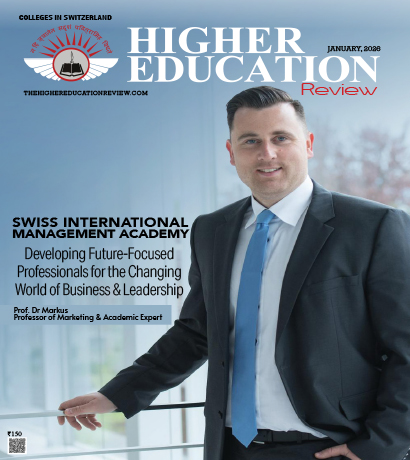How Idaho’s Private Colleges Nurture Leaders and Shape Careers
 In Idaho’s private higher education landscape, academic programs are more than mere pathways to degrees. The academic programs of Idaho's private colleges provide opportunities for leadership, career preparation and personal development. These institutions connect theory to experiences, helping graduates enter the workplace well-prepared while serving their communities. Whether in classrooms, labs, and clinical environments, these institutions develop not just learning, but the confidence and capability to lead.
In Idaho’s private higher education landscape, academic programs are more than mere pathways to degrees. The academic programs of Idaho's private colleges provide opportunities for leadership, career preparation and personal development. These institutions connect theory to experiences, helping graduates enter the workplace well-prepared while serving their communities. Whether in classrooms, labs, and clinical environments, these institutions develop not just learning, but the confidence and capability to lead.
By adopting a vision of holistic education, students are not only prepared for immediate employment but also equipped for a lifetime of learning and leading. Faculty-directed mentorship, collaborative team projects with community partners, and partnerships with community organizations assist students to overcome real-world challenges.
Business Administration and Management
Business Administration continues to be one of the most popular programs in the Idaho private education sector. These programs cover more than accounting and marketing; they prepare students to develop strategic leadership, entrepreneurial mindset, and problem-solving abilities. Students develop the ability to analyze market trends, construct business models, oversee people, and apply a fact-based and data-driven decision-making based on quantity and data. Idaho's growing entrepreneurial ecosystem provides graduates with the opportunity to work in various areas from tech startups to agriculture companies. Often, coursework includes projects, case studies, and internships that reflect the real world challenges. Students develop financial literacy, negotiation skills, global market awareness and the qualities essential for leadership roles. Programs from Northwest Nazarene University and College of Idaho allow graduates to be job-ready as well as build and scale businesses in competitive landscapes.
Engineering and Applied Sciences
Idaho’s private colleges and universities offering engineering and applied sciences programs to prepare students to design, innovate, and solve complex real-life problems. Students gain a strong foundation in mathematics, physics, and materials science while specializing in fields such as civil, mechanical, or computer engineering. These programs emphasize project-based learning, including collaborative research opportunities, and including cutting-edge technologies such as CAD modeling, automation, and renewable energy systems.
Graduates will be equipped to work across industries advancing infrastructure, developing advanced manufacturing, and implementing technology-based solutions. The Northwest Nazarene University offers engineering pathways that combine rigorous technical training with an understanding of ethical and sustainable practices, ensuring graduates are ready for both local and global engineering challenges.
Nursing and Healthcare
In an era when there is a severe shortage of workers in healthcare, Idaho's private colleges  and universities are contributing significantly by equipping competent nursing professionals. Nursing programs in Idaho are founded on clinical competence, patient-centered care, and adaptability in stressful and complex situations. Students study a wide range of subjects, including anatomy, physiology, pharmacology, and evidence-based practice, and learn the practical, clinical application through clinical rotations.
and universities are contributing significantly by equipping competent nursing professionals. Nursing programs in Idaho are founded on clinical competence, patient-centered care, and adaptability in stressful and complex situations. Students study a wide range of subjects, including anatomy, physiology, pharmacology, and evidence-based practice, and learn the practical, clinical application through clinical rotations.
"We have a real shortage of nurses, but we also have a shortage of educators that are able to teach nursing," NNU College of Nursing Dean Dr. Linda Valenzuela said. "So that combined with a lack of space, it creates challenges. Here at NNU, we don't believe in a waitlist. We really strongly believe that if God puts it on your heart to be a nurse, we want to be able to support you and help you fulfill your dream."
Modern healthcare required nurses who could apply technology in patient care, synthesize complex medical data into patient care, and could lead a healthcare team. The nursing programs prepare graduates to practice in hospitals, long-term care and other specialty units through a combination of theory, simulation labs and community health projects. Graduates from private nursing programs such as Northwest Nazarene University's School of Nursing and College of Southern Idaho have been noted to have higher licensure pass rates, and are highly sought-after, regionally and nationally.
“A lot of the hospitals, including St. Luke’s, are interested in hiring nurses at the bachelor’s level,” Dr. Barry Pate, the Dean of Career and Technical Education at the College of Southern Idaho said. “We can’t do that internally, so our partnerships with ISU allow students to transfer and finish the bachelor’s degree.”
 Liberal Arts and Interdisciplinary Studies
Liberal Arts and Interdisciplinary Studies
Degree programs in liberal arts and interdisciplinary studies develop critical thinking, communication, and analytical skills that exceed various career or occupational fields. Through disciplines in the liberal arts such as literature, philosophy, history, and social sciences, students integrate various disciplines and address cultural and social issues from a more comprehensive perspective. The goal is to create flexible professional thinkers functioning within a variety of workplaces and preparing them for multiple global and complex challenges.
Students enhance their ability to approach problems from different stand points, which can be achieved through research projects, service-learning opportunities, or collaborative seminar courses. The College of Idaho and New Saint Andrews College are outstanding examples, in the area of liberal arts or interdisciplinary study, of institutions that involve students in traditional liberal arts disciplines in conjunction with recent disciplines such as environmental studies and digital media.
Psychology and Behavioral Sciences
Programs in psychology and behavioral sciences focus on understanding human thought,  emotion, and behavior, and they prepare graduates for careers in research, counseling, mental health, social services, and education. In a psychology program, students explore cognitive psychology, lifespan development, abnormal psychology, and behavior analysis.
emotion, and behavior, and they prepare graduates for careers in research, counseling, mental health, social services, and education. In a psychology program, students explore cognitive psychology, lifespan development, abnormal psychology, and behavior analysis.
“We need more psychologists in the state, and that means we need more pipelines,” said Thomas Farrer, director of clinical training for the Psy.D. program. “Psychology is one of the most popular majors at every school in Idaho. We have plenty of interested students, but they’ve had to leave Idaho to do their training because there weren’t enough training programs.”
Psychology and behavioral sciences programs are becoming increasingly focused on evidence-based practice, cultural sensitivity, and ethical decision-making— all skills that are becoming necessary in healthcare, education, and organizational development. Northwest Nazarene University and Boise Bible College offer psychology or psychology-related programs that ensure students not only study theory but also consider real-world implications and practicality in their applied practice—all while preparing graduates for work and graduate school.
Keith Hansen, director CMHC said, "We need psychologists who are ready to start thinking outside of the box, outside of the traditional urban environment. We need to start taking a more complex look at rural life versus urban life."
Conclusion
Idaho's private colleges prepare students for the workforce while developing future leaders in high-demand disciplines and programs such as business, education, engineering, healthcare, liberal arts, and psychology. These programs provide participants with more than education, fostering critical thinking, ethical and moral reasoning, and collaborative abilities that are hallmarks of quality leadership. Whether it's a business graduate developing a business, an educator transforming a rural school, a nurse providing leadership to a patient care team, or a psychologist taking a lead role in community mental health initiatives, the work of these premier programs influences much more than the classroom. Idaho's private colleges demonstrate that when a learning experience focuses on leadership, it can transform careers and transform communities.

